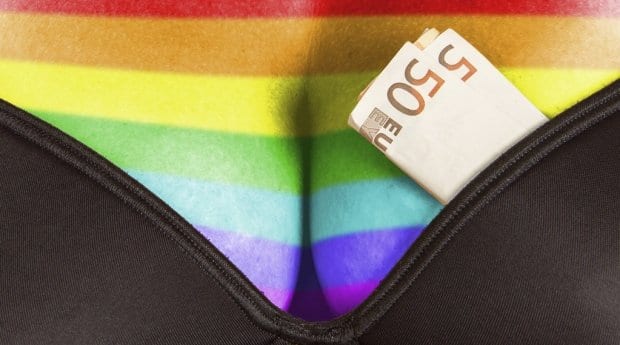It’s that time of year, friends, and it’s my favourite: Pride season. Get ready to see rainbows and tons of beautiful queers everywhere, rocking events from dance parties to hook-up nights to political art shows to classic Pride events like the Dyke March. But it’s also another time of year — the time for capitalism to rear its ugly head and remind all the queers out there that although the mainstream straight society might not really care about homeless queer youth, violence against trans women of colour, queer suicide, queer incarceration — or basically anything other than queers assimilating into marriage — they definitely do care about our spending money.
Pride season is tough. I’ve had friends who felt like they needed to leave Prides because of the corporate energy in a space that was once a bastion of resistance to anti-queer attitudes and violence. Some of the first Pride celebrations, after all, were events like the Stonewall Riots or Operation Soap, when immense police brutality occurred against queer and trans folk. These marches were led by some of the fiercest and most resilient queer and trans folk, many of whom still wouldn’t have access to safe(r) spaces, equal employment rights or housing rights today.
Tons of major corporations will most likely spend the next couple months shoving it down our throats that they “don’t hate the gays” so that they can make tons of money off of our rainbow dollars. Don’t be fooled, folks. What do these corporations and companies do for the LGBT community outside of Pride season? It can be so easy to choose to buy a case of Corona because you saw it sponsored an event at Pride somewhere. But before we label a company as an ally, we need to really examine if its actions go beyond Pride season, or if it is merely paying us lip-service.
Figuring out what questions to ask can be hard though, so here’s a few to get you started:
Does the company donate money to LGBT groups, charities and organizations? If so, are these groups the ones who get the most recognition (ie most sponsorship recognition, brand recognition) like GLAAD, Dan Savage’s (ew) It Gets Better, the HRC or other Gay Inc organizations? Or are they community based charities, ones that make active changes in individual queer peoples’ lives?
Does it provide safe(r) space training to employees? Does it require that employees maintain a sense of respect, love and acceptance towards other employees who may be queer or trans?
Does it have anti-discrimination policies in place for both staff and clients/customers? What policies do they have in place to make sure that LGBT people are treated safely and respectfully?
Does it prioritize hiring folks who have marginalized identities, including trans women and queer or trans Indigenous folks and people of colour?
Do they include LGBT people in their company? Or do they tokenize, choosing to bring out queer representation only when it suits them or is convenient?
If it’s an alcohol company, does it recognize that queer people are at higher risk of experiencing alcohol addiction? Does it recognize how alcohol may play into the violence that LGBT people face daily?
But most importantly, does this company recognize how capitalism is generally a form of a societal structure that is used to oppress all marginalized groups, including queer and trans people? Does it acknowledge that queer people (particularly queer women, disabled queers, trans folk and queer men of colour) are more likely to be living in poverty and thus negatively affected by the results of capitalism?
These questions are important. It’s important that we think critically about the products, companies and corporations that we invest in. Don’t let yourself be fooled into believing that you’re spending money on something queer-friendly without having done the research first. Invest in the lives of queer people, especially those most oppressed, and consume responsibly.
There are hundreds of fantastic companies and for-profit groups that invest in LGBT people and their lives outside of Pride season. Consider Starbucks, a company that (in the United States, anyway) has maintained benefits to all domestic partnerships for over 20 years, and has an active network devoted to supporting LGBT people at Starbucks.
If you’re a part of a company that invests in Pride, don’t think that I’m dismissing you or your employer; rather, if you can’t proudly answer questions about your company’s involvement with the LGBT community, then maybe you’re working at the wrong place. (Although, I still recognize that we work out of necessity, and don’t have the freedom to wait around for an ethical company to hire us.) If you feel like I’m criticizing where you spend eight hours a day, considering asking these questions around your workplace and see if your bosses or supervisors respond positively. Are they actively interested in building a better workplace and company for LGBT people? Or are they simply throwing money at a big party where queers spend tons of money?
Don’t get me wrong, it’s not like I’m spending hours every day researching and reading about corporations’ philanthropic sides or anything. But when I go to the liquor store and pick up a beverage for the night, I’m not telling myself it’s for the betterment of queers everywhere. It’s not Pride season that dictates my shopping choices — it’s my own active, conscious decision.
This is an edited version of a previously published article on jacqbrass.com
Jacq Brass is a spoken word artist and writer. She currently resides in Yellowknife, Northwest Territories.


 Why you can trust Xtra
Why you can trust Xtra


